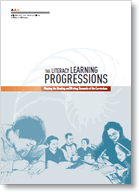You are here:
References
Allcock, J. (2004). Switch on to Spelling. Paremata: M. J. A. Publishing.
asTTle technical reports and user manual, available at http://e-asttle.tki.org.nz/
Borderfields Consulting (2009). Literacy Learning Progressions: Report on Analysis of Feedback on the Draft Document. Available at https://www.educationcounts.govt.nz/publications/schooling/43632
Clay, M. (1998). By Different Paths to Common Outcomes. York, Maine: Stenhouse.
Clay, M. (2002). An Observation Survey of Early Literacy Achievement, 2nd ed. Auckland: Heinemann.
Croft, C. with Mapa, L. (1998). Spell-Write: An Aid to Writing and Spelling, rev. ed. Wellington: New Zealand Council for Educational Research.
Crooks, T. and Flockton, L. (2005). Reading and Speaking Assessment Results 2004. National Education Monitoring Report 34. Dunedin: Educational Assessment Research Unit, University of Otago.
Crooks, T. and Flockton, L. (2007). Writing Assessment Results 2006. National Education Monitoring Report 41. Dunedin: Educational Assessment Research Unit, University of Otago.
Darr, C., McDowall, S., Ferral, H., Twist, J., and Watson, V. (2008). Progressive Achievement Test: Reading: Teacher Manual, 2nd ed. Wellington: NZCER.
Davis, A. (2007). Teaching Reading Comprehension. Toronto: Thomson Nelson.
Henry, M. K. (2003). Unlocking Literacy – Effective Decoding and Spelling Instruction. Baltimore: Paul H. Brookes.
International Association for the Evaluation of Educational Achievement (2006). Progress in International Reading Literacy Study (PIRLS) Assessment Framework and Specifications. Amsterdam: International Association for the Evaluation of Educational Achievement.
Makin, L., Jones Diaz, C., and McLachlan, C. (2002). Literacies in Childhood – Changing Views, Challenging Practice, 2nd ed. Sydney: Elsevier.
McDonald, T. and Thornley, C. (2005). “Literacy Teaching and Learning during the Secondary Years – Establishing a Pathway for Success to NCEA and Beyond”. Set: Research Information for Teachers, no. 2.
McNaughton, S. (2002). Meeting of Minds. Wellington: Learning Media.
Ministry of Education (1996a). Exploring Language: A Handbook for Teachers. Wellington: Learning Media.
Ministry of Education (1996b). Te Whāriki: He Whāriki Mātauranga mō ngā Mokopuna o Aotearoa/Early Childhood Curriculum. Wellington: Learning Media.
Ministry of Education (1999). Literacy Experts Group Report to the Secretary of Education. Wellington: Ministry of Education.
Ministry of Education (2003). Effective Literacy Practice in Years 1 to 4. Wellington: Learning Media.
Ministry of Education (2003). The New Zealand Curriculum Exemplars. Wellington: Learning Media and the Learning Centre Trust of New Zealand.
Ministry of Education (2004). Effective Literacy Strategies in Years 9 to 13: A Guide for Teachers. Wellington: Learning Media.
Ministry of Education (2006). Effective Literacy Practice in Years 5 to 8. Wellington: Learning Media. Ministry of Education (2007a). Literacy Learning Progressions: Meeting the Reading and Writing Demands of the Curriculum (Draft for Consultation). Wellington: Learning Media.
Ministry of Education (2007b). The New Zealand Curriculum for English-medium Teaching and Learning in Years 1–13. Wellington: Learning Media.
25
Ministry of Education (2008a). The English Language Learning Progressions: A Resource for Mainstream and ESOL Teachers. Wellington: Learning Media.
Ministry of Education (2008b). Pasifika Education Plan 2008–2012. Wellington: Ministry of Education.
Ministry of Education (2009a). Ka Hikitia – Managing for Success: The Māori Education Strategy 2008–2012, updated ed. Wellington: Ministry of Education.
Ministry of Education (2009b). Learning through Talk: Oral Language in Years 1 to 3. Wellington: Learning Media.
Ministry of Education (2009c). Learning through Talk: Oral Language in Years 4 to 8. Wellington: Learning Media.
Ministry of Education (2009d). The New Zealand Curriculum Reading and Writing Standards for Years 1–8. Wellington: Learning Media.
New Zealand Council for Educational Research (2005). Spell Right! The Essential Lists (CD). Wellington: NZCER.
Organisation for Economic Co-operation and Development (2005). “The Definition and Selection of Key Competencies (DeSeCo)”. Available at www.oecd.org/dataoecd/47/61/35070367.pdf
Paris, S. G. (2005). “Reinterpreting the Development of Reading Skills”. Reading Research Quarterly, vol. 40 no. 2, pp. 184–202.
Pressley, M. (2006). Reading Instruction That Works: The Case for Balanced Teaching, 3rd ed. New York: Guilford.
Progressive Achievement Tests (PATs) website at www.nzcer.org.nz/tests
Snow, C. E., Griffin, P., and Burns, M. S., eds (2005). Knowledge to Support the Teaching of Reading: Preparing Teachers for a Changing World. San Francisco: Jossey-Bass.
Wadestown Kindergarten's Centre of Innovation Research (2009). A Curriculum Whāriki of Multimodal Literacies: Final Research Report Prepared for the Ministry of Education. Wellington: Ministry of Education.
Wylie, C., Thompson, J., and Lythe, C. C. (2001). Competent Children. Wellington: NZCER.


